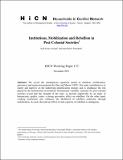| dc.contributor.author | Arcand, J.L | |
| dc.contributor.author | Tranchant, Jean-Pierre | |
| dc.date.accessioned | 2013-12-04T12:45:42Z | |
| dc.date.available | 2013-12-04T12:45:42Z | |
| dc.date.issued | 2012-11 | |
| dc.identifier.citation | Arcand, J.L. and Tranchant, J.P. (2012) 'Institutions, Mobilisation and Rebellion in Post-Colonial Societies', HiCN Working Paper 133, Brighton: Households in Conflict Network | en_GB |
| dc.identifier.uri | https://opendocs.ids.ac.uk/opendocs/handle/20.500.12413/3223 | |
| dc.description.abstract | We revisit the simultaneous equations model of rebellion, mobilisation, grievances and repression proposed by Gurr and Moore (1997). Our main contribution is to clarify and improve on the underlying identification strategy and to emphasise the role played by the institutional environment. Instrumental variables estimates for post-colonial
societies reveal that the strength of the state, as proxied empirically by an index of
bureaucratic quality, exerts a strong preventive effect on rebellion. On the other hand,
working institutions also influence the likelihood of rebellion indirectly, through
mobilisation. As such, the total net effect of state capacity on rebellion is ambiguous. | en_GB |
| dc.language.iso | en | en_GB |
| dc.publisher | Households in Conflict Network | en_GB |
| dc.relation.ispartofseries | HiCN Working Paper;133 | |
| dc.rights.uri | http://www.ids.ac.uk/files/dmfile/IDSOpenDocsStandardTermsOfUse.pdf | en_GB |
| dc.subject | Governance | en_GB |
| dc.subject | Security and Conflict | en_GB |
| dc.title | Institutions, Mobilisation and Rebellion in Post-Colonial Societies | en_GB |
| dc.type | Series paper (non-IDS) | en_GB |
| dc.rights.holder | HiCN | en_GB |
| dc.identifier.externaluri | http://www.hicn.org/wordpress/wp-content/uploads/2012/06/HiCN-WP-133.pdf | en_GB |
| dc.identifier.team | Vulnerability and Poverty Reduction | en_GB |

